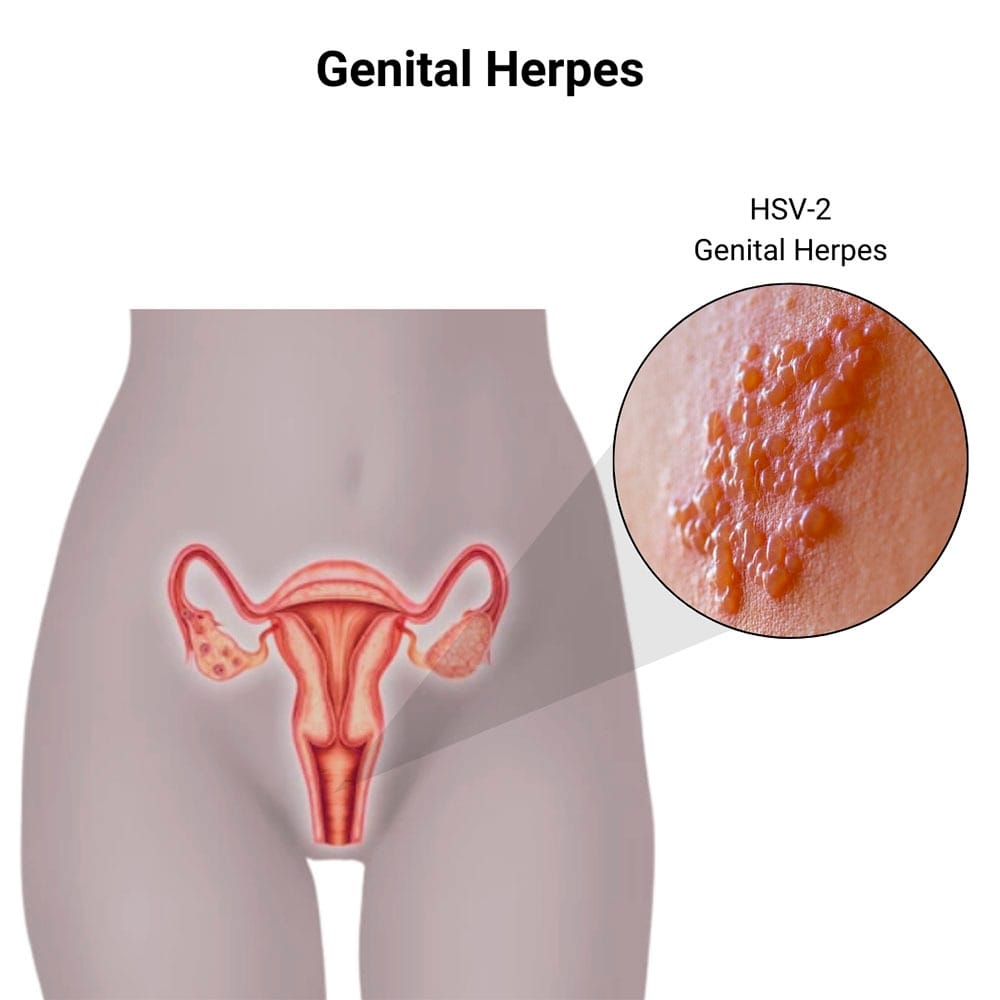What Is Genital Herpes?
 Genital herpes is a sexually transmitted disease (STD) that affects both men and women. It’s caused by the herpes simplex virus (HSV). Symptoms may be mild to severe, depending on the person. It occurs in women more often than men. Most people don’t even know they have genital herpes until outbreaks occur in the first year after infection.
Genital herpes is a sexually transmitted disease (STD) that affects both men and women. It’s caused by the herpes simplex virus (HSV). Symptoms may be mild to severe, depending on the person. It occurs in women more often than men. Most people don’t even know they have genital herpes until outbreaks occur in the first year after infection.
Two types of HSV cause genital herpes:
- Herpes simplex virus type 1 (HSV-1). This strain is related to oral herpes. It causes sores around the mouth but can also spread to the genital area through oral-genital contact.
- Herpes simplex virus type 2 (HSV-2). This usually is the primary cause of genital herpes, leads to more outbreaks and creates severe symptoms in the genital area.
Due to already compromised skin integrity, when you have genital herpes, you’re at high risk of getting genital warts, which is a symptom of the condition called human papillomavirus (HPV). Active genital herpes may be very painful and disturbing, and it can affect your sexual life, as well as your partner’s.
Dr. Felix Cohen, founder and director of Cohen Medical Practice (CMP), is a top-notch OB-GYN who offers specialized counseling as well as treatment for your issues without making you feel awkward.
He offers a full slate of STD diagnostic tests and treatments for conditions that include:
What Are the Symptoms of Genital Herpes?
STDs may sometimes be asymptomatic, but signs and symptoms also depend on the outbreak, whether it’s the first outbreak or a recurrent one. Symptoms of herpes tend to appear after two to 12 days of exposure to the virus.
Common signs and symptoms for the first outbreak include:
- Sores and blisters that are painful. It occurs around the genital area, anus, buttocks or thighs. They may ooze and develop into painful ulcers.
- Itching and burning. Before sores appear, you may feel a burning sensation in the genital or anal area.
- Flu symptoms. You may get a fever, body aches and swollen lymph nodes.
- Painful urination. If you have sores near the urethra, it may be painful to pee.
- Vaginal discharge. Some women report a discharge as well.
If you have a recurrent outbreak, then you may get symptoms weeks, months or even years after the initial infection. Symptoms are similar and include smaller sores, tingling, itching and burning. If symptoms aren’t managed, then transmission risk increases, and chances of incurring HIV increase as well. Untreated symptoms cause severe pain during normal activities like urinating and intercourse.
What Causes Genital Herpes?
Genital herpes is caused by the herpes simplex virus. HSV-2 tends to cause more recurrent genital outbreaks than HSV-1. The virus spreads through close contact during sex, where the skin or mucus membranes come into contact. Even if an infected person has no symptoms, through asymptomatic shedding, the other person can contract the virus.
Other contributing factors include:
- Multiple sexual partners
- Weak immune system
- Touching the infected area
Your physician from NYC usually performs a physical examination before ordering other tests. If sores and blisters are present, your CMP doctor may order a sample from the lesion to test for HSV.
Other diagnostic tools include:
- Antibody blood tests
- IgM test
- Type-specific serologic testing
How Can I Treat Genital Herpes?
You can treat genital herpes, but not cure it. Once infected with the virus, it stays in your body for life. Doctors prescribe medications to manage the symptoms, reduce outbreaks and decrease the chances of transmission.
Treatment strategies include:
- Taking antiviral medications
- Using pain management medications
- Making lifestyle changes, such as correct hygiene care and safe sex practices
- Identifying and avoiding triggers
If you’re pregnant, your physician monitors you closely, as herpes can be transmitted to the baby during delivery. Anti-viral medications are added around the time of labor, or in some cases, C-sections are recommended to prevent neonatal herpes, which is life-threatening for babies. For proper guidance and counseling about herpes, you need to have an experienced OB GYN like Dr. Cohen working with you.
What Complications Can Occur Due to Genital Herpes?
This virus leads to many complications that affect your overall health, as well as your mental health. It causes internal inflammation of the sexual organs and causes extreme finger and eye infections that cause pain and vision issues. In rare situations, it leads to brain swelling.
Although it has no cure, with proper management, you can reduce the risk of transmission and severity of symptoms. Many people report living healthier lives with the right treatment and lifestyle changes. Genital herpes outbreaks also can lead to extreme emotional stress, which is why it’s recommended that you have open communication about this disease with your partner.
If you’re experiencing unusual symptoms around your genital area or any kind of sores and blisters, don’t hesitate to get medical advice right away. The quicker you catch it, the better the chances that severe consequences can be avoided. Dr. Cohen not only treats your medical issues, but listens to you closely as well, making you feel heard and understood. Contact Cohen Medical Practice (CMP) right away to learn what your genital herpes treatment options are.

